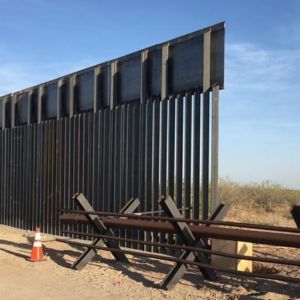President Trump is hiring attorneys to carry out his mission to build a border wall with Mexico. No, these lawyers will not be tasked with welding steel together or digging holes. Instead, they will focus on filing lawsuits to take private property from Americans who own the land where the president wants to build the wall. This is a misallocation of public resources and a violation of the rights of Americans.
The reason is that the border wall will not be constructed on the physical border with Mexico. Border Patrol will build it wherever it is most convenient for its purposes. Indeed, some Americans actually live on the “Mexican” side of the wall, even though their home is located on U.S. soil. They need to pass through the “gate” every day to get to work or school.
In Texas, the entire “border” is actually in a body of water: the Rio Grande, meaning it is physically impossible for the government to build a border wall on the actual border line with Mexico. Due to flooding, it is also generally impossible for it to place the fence anywhere near the banks of the river either. The end result is that the government needs to build as far as mile inland.
Land along the Rio Grande in Texas is almost entirely privately owned. Indeed, a third of the border is under non-federal ownership. This means that those lawyers that Trump is hiring will be busy, filing hundreds or thousands of actions to pull land away from Americans who live where it will place his wall. In Texas, there are 4,900 parcels of property within 500 feet of the border. Those parcels may have multiple owners — each of which will lose out from Trump’s wall.
Eminent domain not only deprives the person of the value of the land taken — which could be minimal in some cases; in other cases, it could be everything — but also the value of the rest of the property owner’s land. For example, the Bush administration built a fence effectively putting a golf course in “Mexico,” which put it out of business in 2015.
All the people living “in Mexico” don’t get compensation unless they actually lose their land for the fence. The fact that they now have to knock to enter their own country isn’t worth a dime. Likewise, a 10-foot fence built a foot from your property doesn’t count either.
The entire process of “eminent domain” — the legal term for government taking private property — along the border makes a sham of the Constitution’s requirement that “private property (not) be taken for public use, without just compensation.” Border Patrol can send a letter requesting that the owner “voluntarily” give up the land in exchange for some minor amount, not based on an appraisal of its value.
If they don’t believe that’s “just compensation,” the government will just stick the money in an escrow account and take the land anyway. They can build a huge wall through your house, while you fight for what you think is fair in court. Of the land already taken, wealthy property owners fought and won settlement triple what the government offered, while poor ones took whatever the government offered. That’s a mockery of the Constitution, and multiple bills would fix the issue.
The Constitution also requires that taking be done for “public use.” Obviously, a border wall based on legitimate security analysis would qualify as a public use, but no independent authority has ever concluded that a border wall will significantly affect illegal crossings. The Congressional Research Service concluded that a single-layer “fence, by itself, did not have a discernible effect on the influx of unauthorized aliens coming across the border in San Diego.”
The reason that the president is so adamant about building a border wall is not because it is in the public interest, but because it is in his private interest, since he made it the central promise of his campaign in 2016. Building a border wall solely to satisfy a political campaign promise would also render the words of the Constitution a laughingstock. American taxpayers (not Mexican ones, as was also promised) should not pay to steal private property from Americans to help the re-election prospects of one politician.

